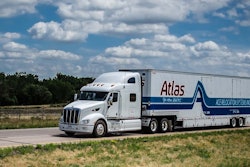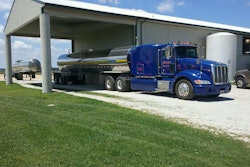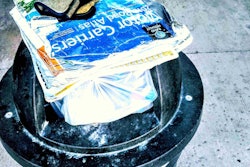Finn Murphy
Occupation: Household mover, American author
Past jobs: Service station attendant, Clothing merchant, Mayor
“Low Company and Hard Work”
C.S. Lewis once defined a classic as a book you read over and over again. Now on my fifth listen to “The Long Haul: A Trucker’s Tales of Life on the Road,” by Finn Murphy, read by Danny Campbell for High Bridge, there is little doubt that, if audiobooks count as well, this veteran household mover’s eloquent and sometimes jaded elegiac on the the life of a long-haul mover is destined to attain that distinction.
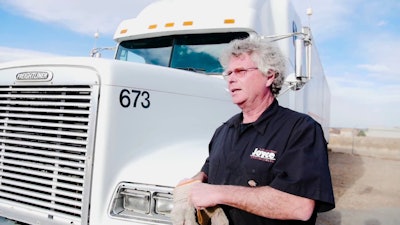 Finn Murphy, pictured in this video from his book’s publisher, W.W. Norton.
Finn Murphy, pictured in this video from his book’s publisher, W.W. Norton.It was about a year ago when the 60-year-old contractor for boutique VIP specialist Joyce Van Lines checked in with Overdrive sister publication Truckers News‘ David Hollis, just as Murphy’s book was rolling out in hardback, audiobook, and Kindle. Now , after selling out of its first three hardback printings, “The Long Haul” is out in paperback, and is everywhere. We just picked up the last two copies that Barnes and Noble had in Madison, Wis. One for me; one for my dad.
The book’s appeal lies in the premise that a literate individual, when placed in a situation where he is consigned to work in some hard and harrowing trade, in a life far different than that for which he was groomed, can attain certain insights which are only attainable while living at the edge of one’s physical and mental limitations. In so doing, Mr. Murphy articulates these truths in a form of literature evocative of the wandering wordsmiths of days past — such as Herman Melville, John Steinbeck, and Louis L’Amour.

Son of the famed illustrator John Cullen Murphy (“Prince Valiant,” “Big Ben Bolt”), Finn Murphy was raised in a devout Catholic home, a middle child with seven brothers and sisters. He describes his mother Katherine Joan Byrne Murphy, to whom his book is dedicated, as an “‘Irish matriarch’ who taught me how to read.” Life centered around St. Catherine of Siena church, where he served as an altar boy; however, young Finn acquired a love for “low company and hard work” while working at Dan’s Service Station in Cos Cob, Connecticut. There, the salty, work-hardened men from Callahan Bros. Moving and Storage, agent for North American Van Lines, would congregate every night with their cooler full of Schaefer to swap war stories from the craft. Maybe it was the writer in young Murphy that was mesmerized by these accounts. Maybe it was the then unattainable supply of Shaefer that sweat-brined band of brothers enjoyed, or maybe it was the fact the movers were clearly a few rungs up from the lowly service station employees at Dan’s; but shortly after his 18th birthday, he would join the ranks of Callahan Bros. for his summer job.
His first day was a disaster; its casualties included his bosses’ car, three high-end mirrors, four picture frames, the top of an antique vanity, and a ceiling through which he fell. There is something about the quiet dignity with which the novice is treated by John Callahan at the end of his first day that endears the reader to this most “artisanal” form of trucking:
I went into the foyer where the time clock was, grabbed my virgin time card … and laid it on John’s desk. “I won’t need this anymore. Please don’t pay me for today either. I must have cost you more money today than any ten guys.” John looked up from his pile of claim forms, eyed me narrowly, paused a moment, and handed the time card back to me. “Go punch out. You’ll need this card tomorrow. Don’t be late. We’ve got a busy day.”
Seduced by the Life
It was during an independent study young Murphy was engaged in during his junior year at Colby College (while doing an analysis of, and lumping for, one Willie Joyce as a cross-country movers’ helper) that he was completely seduced by the life. His study concluded that a long-haul mover, circa 1980, was knocking down at least $2,000 a week. Joyce, another suburban kid with an acute case of wanderlust from nearby Stamford, had come to loom in Mr. Murphy’s imagination as a revolutionary figure. He once had a girlfriend named Diana Mr. Murphy had met during an earlier day trip. She was a college music major with the sultry voice of Joey Heatherton.
Murphy recounts her sitting cross-legged in the sleeper, singing 16th-century madrigals in a “come to bed with me” voice while crossing the Chesapeake Bay Bridge-Tunnel. Folks, it doesn’t get much more Freudian than this. Willie Joyce was toting his own personal Homeric Siren, and there was no Circe onboard to save young Finn, the sacristan; now that’s recruiting, people!
It was Diana’s stated mission in life to christen every state in the lower forty eight with the consummation of her bohemian betrothal to Willie. Before they finally called it off, Diana and Willie had snapped off 46 states.
Author Michael Walker once contended that the 60s didn’t really end until 1973. Turns out, Willie Joyce was keeping the drive alive nearly into the 80s. Within six months, Finn Murphy had his own rig leased with Callahan Bros., riding for the North American brand, looking for a Diana of his own.
Murphy’s account of the six-week odyssey with Joyce, who would later become the CEO of the high-end boutique Joyce Van Lines, is nothing short of epic. I won’t give the entire book away, but note that one of its most interesting details was when Finn had to bail Willie out of a Davenport, Iowa jail.
Mr. Joyce recounted to me in a phone interview that he had been taken to court for being on the wrong road during sub-zero temperatures, held due to lack of space in a solitary cell, and somehow, Murphy, who was not yet of legal truck-driving age, had figured out how to get himself from the truck on the outskirts of town where Joyce had been arrested to the downtown jail to get him bailed out.
There are details in the life of a select fraternity that only find their sole rightful place in the memories of that handpicked few, and this may be such a case.
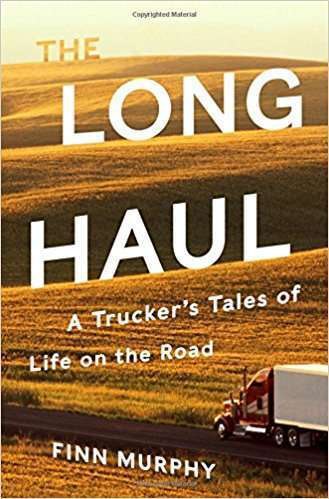 Finn Murphy’s book is widely available in multiple formats at retailers nationwide and online.
Finn Murphy’s book is widely available in multiple formats at retailers nationwide and online.Just how did Finn get himself to that jail? I never could pull that one out of Willie. All I could hear from the veteran mover turned van line owner was the gratitude he had for his old friend’s resourcefulness in getting him out of that solitary cage. The two Connecticut yankees then headed to a Davenport court, paid the fine, and went back to work.
In fact, there is something about the camaraderie and pure meritocracy within the culture of movers, the order and rhythym of that life, to which Mr. Murphy’s narrative brilliantly imputes a sacred significance. I caught up with the author/driver himself a few days ago over the phone. He was broke down in Denver, sitting on the shoulder of 470, wondering why he was even still out here.
He has been featured in the New York Times, NPR’s Fresh Air with Terry Gross, the L.A. Times and the Paris Review, to mention just a few.
As the low-air alert system on the 2018 Freightliner sounded in intervals, Mr. Murphy , whose siblings include a writer for Vanity Fair and an editor for another major publication, articulated to me, in a soft-spoken New England dialect, “the authentic kinship of doing hard work with a group of men.”
“There is a great deal you can learn about someone very quicky,” he said, “their work habits and character, when you’re under a move.”
Written in the last days of pre-ELD America, “The Long Haul” is every much a living encyclical on the dignity of labor as it is an accurate detail of a long-haul mover’s life in the days of paper logs. Mr. Murphy pulls no punches with his own personal errata during his career as a driver, often casting himself as an antihero when the situation calls for it. It’s as if he is making a disinterested inventory of his life, and noting its blemishes like so many three-inch scratches on Ethan Allen night stands.
If the situation called for it, yes he would burn 1,095 miles in 22 hours, with “Born to Run” blasting through state-of-the-art speakers somewhere North of Rahway, N.J. If a customer misrepresented her shipment’s weight to him, like the hoarding Mrs. Murphy, yes he would purchase 100 gallons before weighing the load. Then, well, there was the incident involving the wife of a cruel colonel.
You’ll just have to buy or download the book to get the skinny on that one. That’s his story to tell.
Like a lot of us, Mr. Murphy had a hiatus from trucking which lasted several years. During that time, he became a successful businessman and mayor. Somehow, though, like many gear-jammers, he wound up out here again. “I took a match to my life,” he explained. At 51, he found himself “unmoored,” in a strange town, and went back to what he knew. The book didn’t go into much detail as to why. That’s what sequels are for.
After five listens, I had to remove the $24.99 download from my Librivox account. It was making me want to be a mover. I was Youtube-ing household moving technique videos which weren’t on the way to my home page. Willie Joyce gave me some parting advice: “Don’t do it.”


